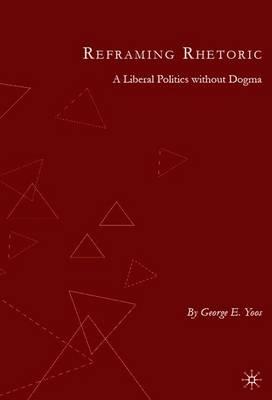Overview
This book is a combination of rhetorical theory and critical thinking. It argues that liberalism in its most meaningful sense is not ideological, but a politics of rational and civic virtue. It uses different frames and references to address problems liberals face in confronting the rhetorical strengths of conservative policy argument.
Full Product Details
Author: G. Yoos
Publisher: Palgrave USA
Imprint: Palgrave Macmillan
Edition: 2007 ed.
Dimensions:
Width: 15.50cm
, Height: 1.50cm
, Length: 23.50cm
Weight: 0.456kg
ISBN: 9781403984029
ISBN 10: 1403984026
Pages: 278
Publication Date: 25 September 2007
Audience:
College/higher education
,
Undergraduate
,
Postgraduate, Research & Scholarly
Format: Paperback
Publisher's Status: Active
Availability: In Print

This item will be ordered in for you from one of our suppliers. Upon receipt, we will promptly dispatch it out to you. For in store availability, please contact us.
Reviews
Writing in a direct style that is often autobiographical and impassioned, George Yoos reconstructs the importance of liberal thought in modern society, and the critical-thinking and rhetorical skills required to nourish it. <br>--David Kaufer, Carnegie Mellon Reframing Rhetoric presents a novel and spirited consideration of liberalism as a method of practical reasoning rather than a political ideology. Its argument for liberalism as the practice of 'good politics' situates accommodation between those with political differences at the center of politics and reintroduces the ancient art of rhetoric as the means to achieve it. Yoos takes conservatism seriously by recognizing its powerful appeal to the common sense of best practices and prudent action. And he takes rhetoric seriously as the means for redefining liberalism. His remedy for liberalism to escape its currently discredited public identity as 'the L word' offers a new way to think about a politics and a rhetoric attuned to concerns of the American public. George Yoos has written a book that will cause readers to think about what is most basic in politics and why rhetoric matters. --Gerard A. Hauser, College Professor of Distinction, the University of Colorado at Boulder
Writing in a direct style that is often autobiographical and impassioned, George Yoos reconstructs the importance of liberal thought in modern society, and the critical-thinking and rhetorical skills required to nourish it. <br>--David Kaufer, Carnegie Mellon Reframing Rhetoric presents a novel and spirited consideration of liberalism as a method of practical reasoning rather than a political ideology. Its argument for liberalism as the practice of 'good politics' situates accommodation between those with political differences at the center of politics and reintroduces the ancient art of rhetoric as the means to achieve it. Yoos takes conservatism seriously by recognizing its powerful appeal to the common sense of best practices and prudent action. And he t
Writing in a direct style that is often autobiographical and impassioned, George Yoos reconstructs the importance of liberal thought in modern society, and the critical-thinking and rhetorical skills required to nourish it. --David Kaufer, Carnegie Mellon Reframing Rhetoric presents a novel and spirited consideration of liberalism as a method of practical reasoning rather than a political ideology. Its argument for liberalism as the practice of 'good politics' situates accommodation between those with political differences at the center of politics and reintroduces the ancient art of rhetoric as the means to achieve it. Yoos takes conservatism seriously by recognizing its powerful appeal to the common sense of best practices and prudent action. And he takes rhetoric seriously as the means for redefining liberalism. His remedy for liberalism to escape its currently discredited public identity as 'the L word' offers a new way to think about a politics and a rhetoric attuned to concerns of the American public. George Yoos has written a book that will cause readers to think about what is most basic in politics and why rhetoric matters. --Gerard A. Hauser, College Professor of Distinction, the University of Colorado at Boulder
Author Information
GEORGE E. YOOS is Professor Emeritus in the Department of Philosophy at St. Cloud University, USA.




